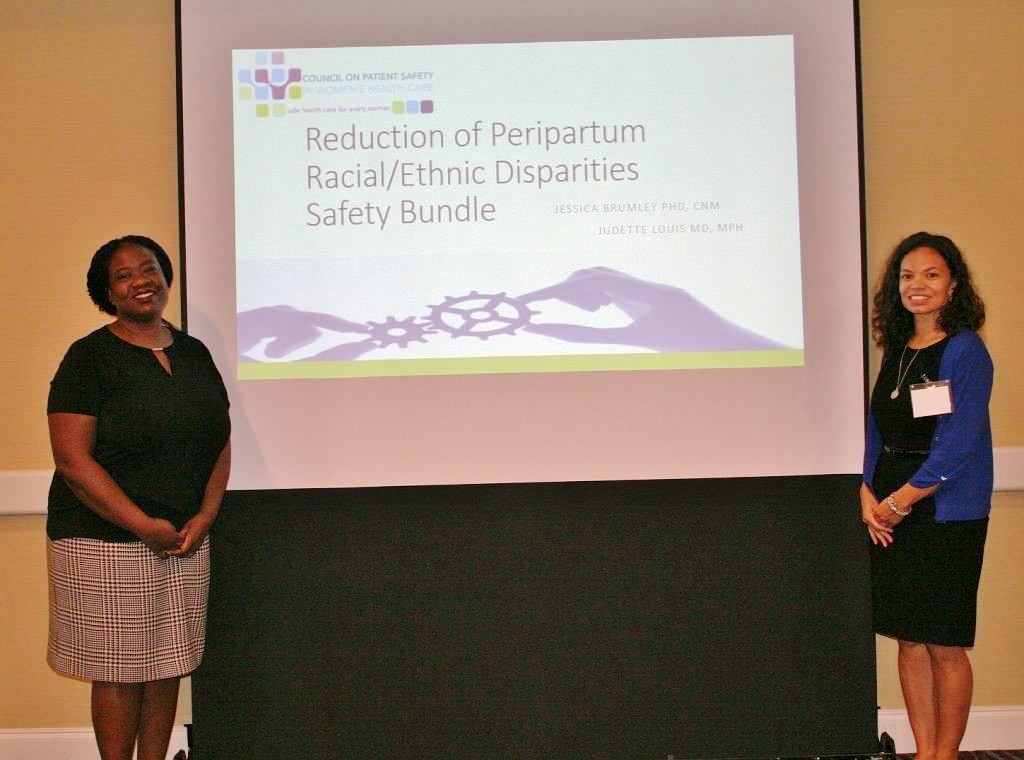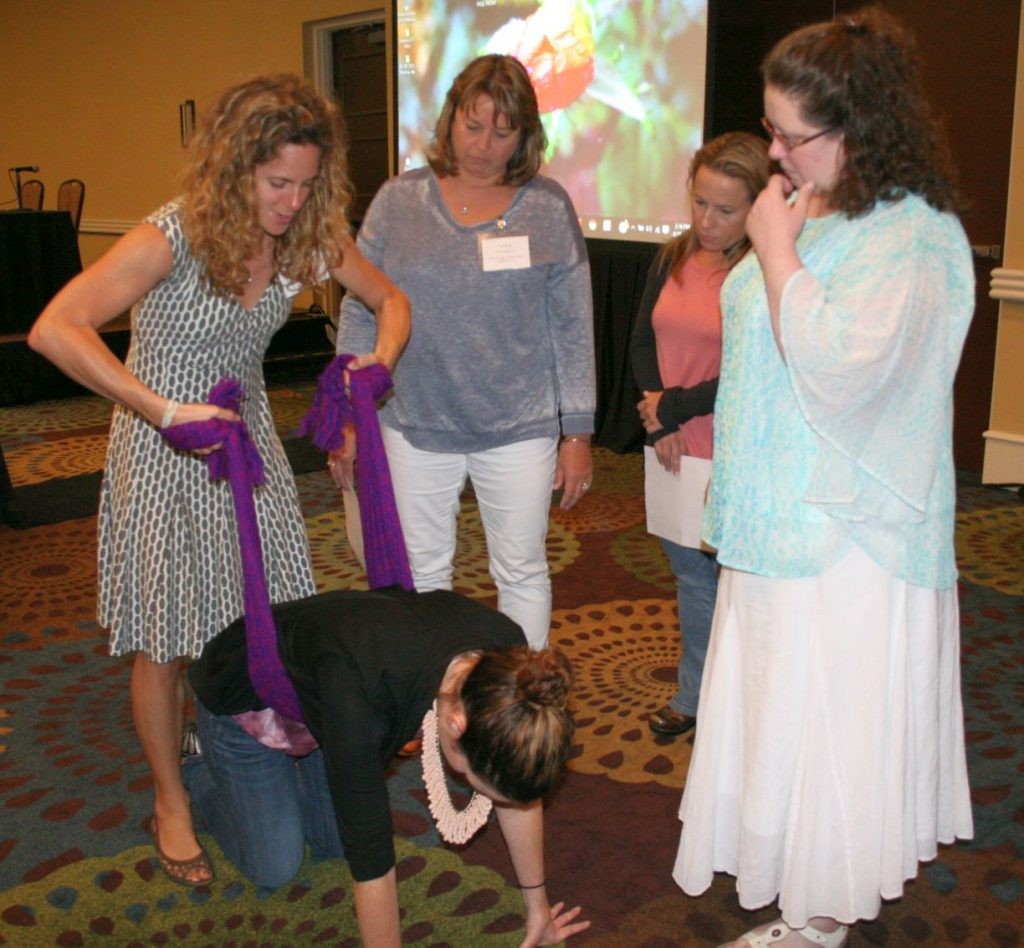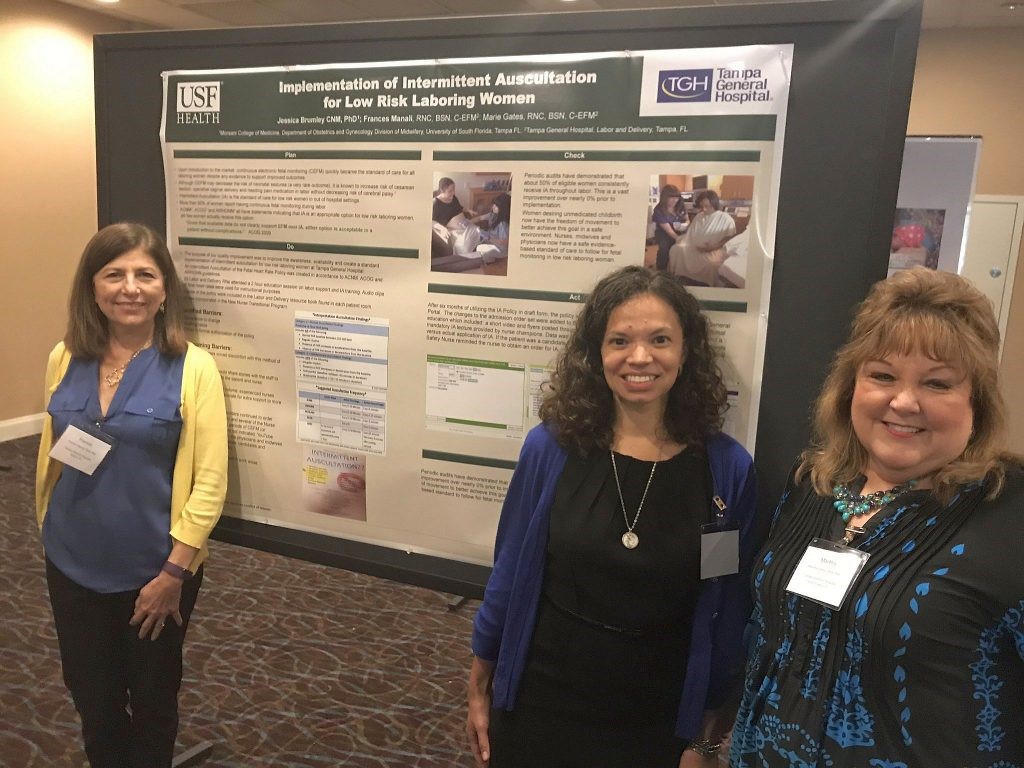FPQC conference expands perinatal care quality and knowledge
The Florida Perinatal Quality Collaborative of the USF College of Public Health held its 2017 annual conference on April 27 and 28 in Tampa, Fla.
The sixth annual conference attracted more than 220 obstetricians, neonatologists, nurses, midwives, and public health and quality improvement stakeholders from across the state.
Perinatal health care professionals joined a statewide conversation on improving the quality of healthcare for mothers, infants, and families at this year’s event.

Lee Health Team receiving the John Curran Quality Improvement Award Ribbon. (Photo by Caitlin Keough)
Dr. John Curran, founding director of the FPQC, presented the FPQC’s first annual John Curran Quality Improvement Award.
This award recognizes a Florida hospital that has made a measurable and sustained positive change in a major perinatal quality improvement issue through the implementation of quality improvement activities within the previous three years.
This year’s winner was Lee Health for their project “Decreasing Maternal Morbidity in a Multi-Hospital System.”
Lee Health received a ribbon and will be recognized at a celebration at their health system hospitals. The University of Florida Jacksonville received an honorable mention for their project “Successful Reduction of Moderate-Severe Intraventricular Hemorrhage (IVH) Using an IVH Bundle: A Quality Improvement Project.”
Heather Barrow of High Risk Hope shared the story of her hospital stay on bed rest and in the neonatal intensive care unit, pointing out key interactions with hospital staff and highlighting how care providers can better interact and empower patients during and after their hospital stay.
“[Providers can be a] match in the darkness, for patients rather than a fire extinguisher,” Barrow said.
Attendees also enjoyed the addition of the parent perspective on a panel to discuss challenges with the periviable infant, which also included an ethicist, an obstetrician, and a neonatologist.
Dr. Sonja Rasmussen of the Centers for Disease Control and Prevention and Dr. Carina Blackmore of the Florida Department of Health presented on the latest information regarding Zika.

Judette Louis and Jessica Brumley presented on Reduction of Peripartum Racial/Ethnic Discrimination (Photo courtesy of FPQC)
Paula Meier, director for clinical research and lactation in the neonatal intensive care unit at Rush University Medical Center in Chicago presented on mother’s milk for very low birth weight infants and the science on the limitations of donor human milk. She also presented best practices that optimize high-dose long exposure to mother’s own milk in the neonatal intensive care unit.
B.Z. Giese, director of the South Carolina Birth Outcomes Initiative, provided an overview of the improvements in infant mortality made through the initiative, as well as how to implement immediate postpartum long-acting reversible contraception (LARC) to improve birth outcomes.
Dr. Maren Batalden, associate chief quality officer at the Cambridge Health Alliance in Massachusetts, presented a conceptual model for co-production of care with patients and families, explaining the degree to which health outcomes related to quality and safety are inevitably co-produced and how engaging with patients can lead to better partnerships and outcomes.

Heather Murphy, CNM, demonstrating supporting vaginal birth skills. (Photo courtesy of FPQC)
William M. Sappenfield, director of the FPQC, presented the State of the Collaborative, bringing stakeholders and attendees up-to-date on statewide collaborative efforts to improve health care quality for mothers and infants. He also announced the upcoming FPQC initiatives: Access LARC, Promoting Primary Vaginal Deliveries (PROVIDE), and Neonatal Abstinence Syndrome (NAS). Recruitment for PROVIDE and Access LARC will launch in summer of 2017, and the NAS project in the summer of 2018.
Attendees also participated in a number of break-out sessions that provided the opportunity for sharing experiences, discussion, and exploration of new areas of perinatal quality improvement.
Small group session topics included: Racial and ethnic health disparities; Florida hospitals working on neonatal abstinence syndrome; supporting vaginal birth skills for nurses; antibiotic stewardship; the FPQC’s perinatal quality indicator system and new birth certificate accuracy pilot project; the FPQC’s mother’s own milk initiative panel of hospital participants; a panel of the FPQC’s hypertension in pregnancy initiative participants; and, a panel from Jacksonville’s pilot to increase access to immediate postpartum LARC.

Tampa General Hospital Team with their poster on Implementation of Intermittent Auscultation in Low Risk Laboring Women. (Photo courtesy of FPQC)
This year’s poster session, in which hospitals and organizations shared their obstetric and neonatal quality improvement initiatives and research, included awards for best poster.
The grand prize was a tie: “Lacto-Manufacturing: Establishing the Need for a NICU Milk Room and Milk Room Technicians” from a team at Winnie Palmer Hospital for Women and Babies; and “Implementation of Intermittent Auscultation for Low Risk Laboring Women” from a team at Tampa General Hospital.
An honorable mention was given to a team from the Florida Department of Health for their poster “Ten Years of Pregnancy-Related Deaths in Florida, 2006-2015.”
The FPQC has started planning for the 2018 conference, which will take place Thursday and Friday, April 19-20, 2018 in Tampa.

Conference attendees at the FPQC’s 2017 annual conference. (Photo by Caitlin Keough)
Story by Emily Bronson, Florida Perinatal Quality Collaborative
